Challenges To Our Understanding Of How The Universe Was Formed: New Origins
The universe has always been there, and will continue to be there? Or is there a beginning, before there is no concept of time? It's hard to say which way is better to explain our existence or which way is more difficult to understand.
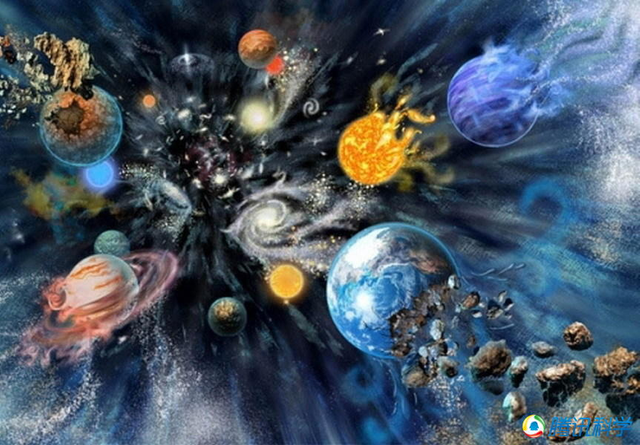
The universe originated in the big bang? In fact, there is a possibility that the universe existed before the big bang--source
You may think that the problem of the origin of the universe was successfully solved by the standard big bang model as early as the 20th century. The universe we live in has always been expanding - distant galaxies are still far away from us. Physicists interpret this phenomenon as an extension of space itself.
Now let's reverse show this big universe. As time has passed, the universe has become hotter and denser. According to Einstein's general theory of relativity, the temperature and density of matter will eventually become infinite, at which time the expansion of the universe will also become infinitely fast. We call that imaginary moment a "big bang."
What happened during the big bang?
We can say that the big bang happened at some time, but we can not say that it happened in a certain space. Since we are observing within and without the outer universe, based on our limited experience, it is easy to assume that it is an explosion that takes place in existing space. But this is wrong. From the moment of the big bang, the space suddenly appeared, its density and temperature tended to infinity, and after that, as the space expanded, the universe kept cooling and turned into what it is today.
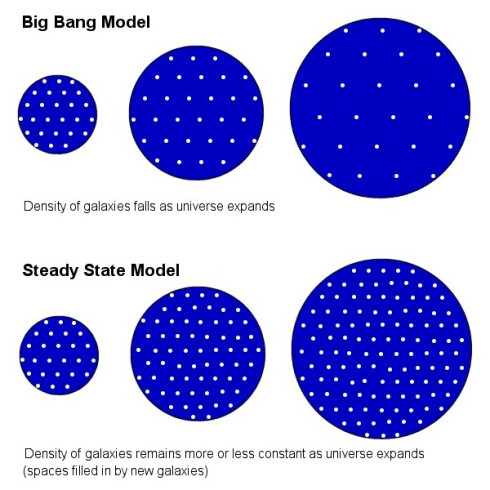
Comparison of the density of the universe as a function of time in the two competing theories.--source
At least, cosmologists tell us so. You often hear them say that the Big Bang is the beginning of the universe, before it was a chaos. To ask "where did the big bang come from" is like asking "Where is the north of the North Pole?" It is not that we do not know the answer, but rather that the issue does not seem to make any sense.
Really meaningless? Taking the big bang as a starting point of time is a prediction of general relativity, not an observed fact. It is hard to imagine exactly what was going on at the time because the early universe was so hot and too dense that even light could not go too far - a large amount of charged particles collided with no movement, photons collided frequently with these particles, Just "run". So the original universe is dark.
However, what makes people confused is that we often use "big bang" to refer to two very different things. The first is the original initial singularity described above; the second is the Big Bang model, which describes the evolution of the universe from the very beginning. The Big Bang model argues that the universe was at an extreme 10 billion years ago - extremely high temperatures, high material densities and even distribution in space. According to this model, as the universe expands and cools, gravitation "pulls" matter together to form stars and galaxies.
The Big Bang model explains the evolution of the universe since it was born. It is based on solid observations and can not be questioned. We have seen the retrograde galaxies; we have seen the formation of galaxies and clusters; we have seen the elements left behind by the "nuclear reaction" of the Big Bang; and of course we have also seen the "afterglow" of the Big Bang - the microwave background radiation.
However, we know little about the big bang. Maybe we can not get a convincing answer soon because it is hard to get the experimental evidence of the time.
The general theory of relativity that predicted the "big bang" is a monument in physics. General relativity also made many other predictions: from light bending to the recently discovered gravitational waves, and in full compliance with experimental tests. But in fact, this theory is not perfect in gravity, especially in extreme conditions - such as the Big Bang.
The problem is that general relativity can not "coexist peacefully" with quantum mechanics. We often hear the statement that quantum mechanics describes events on a very small scale, such as phenomena in the subatomic field. But physicists believe that quantum mechanics is accurate in all circumstances. The early universe had a small scale, and of course the quantum mechanics effect was of course very important. But to explain how quantum mechanics into the big bang model, general relativity can not do that.
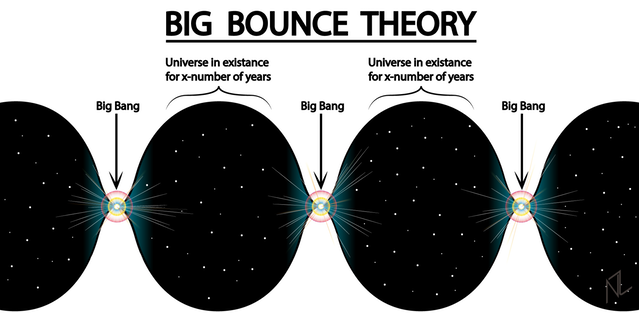
The big bounce theory--source
So, when asked what's going to happen in the big bang, we'd better answer: do not know.
Of course, we have related theories, and physicists are also working to make these theories more accurate and verifiable. The two possibilities we mentioned at the outset - whether the universe has a beginning or not - are all in heated discussions. New ideas for reconciling General Relativity and Quantum Mechanics also help physicists advance these theories, giving us some hope: Perhaps one day we can confidently explain what's happening in the big bang.
Before the big bang
Why the universe may be eternal? Given the lack of understanding of the early universe, it is reasonable to have such doubts. True knowledge should be based on real evidence, not just conjecture. Within seconds of the hypothetical "big bang", the universe is like a nuclear fusion reactor that turns nuclei into light elements such as helium, lithium and deuterium.
Today we can observe the results of these early responses by measuring the abundance of these light elements in the depths of the universe. The results agree well with the general theory of relativity and the predictions of the traditional cosmological model. The early universe was indeed extremely dense and rapidly expanding.
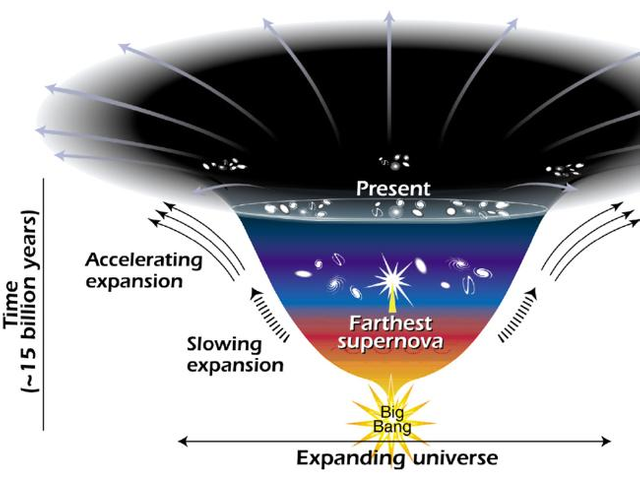
This drawing shows the universe expanding from the time of the Big Bang (bottom) until long past present time (top). No one knows how tall or wide this drawing should go ... or if it should loop back on itself.--source
Well, since these are all true, the universe should have been more dense and swollen faster earlier. Almost certainly, something unexpected happened sometime near the big bang. What could it be?
The easiest answer is "bounce". We can imagine the universe existed before the big bang, except that it had been shrinking. And the subtle point is that for some reason the universe has not collided to become a weird state of infinite density. Rather, it has "rebounded" into a state of expansion that has evolved into the world we now know.
To put it more clearly, such a rally completely fails to comply with our known laws of physics. But as a scientist, we acknowledge that we are not fully aware of the ultimate law, especially in extreme conditions far from our daily experience. Therefore, the universe is also likely to rebound in the past.
But why? We still do not know, but this does not prevent theoretical physicists from making rational and predictive speculation through rich imagination. There is a simple argument: our understanding of gravity is not enough. Of course, Einstein's General Theory of Relativity passed all the validated experiments, but these experiments performed in completely different conditions from the extreme conditions of the early universe. Under sufficiently dense conditions, gravity may no longer be gravity but repulsion. We have no objective reason to conclude that it is right or wrong to judge whether it is right or wrong, but this is indeed a possibility.
Unlimited possibilities in quantum mechanics
Perhaps we should make a more daring assumption that quantum mechanics has changed everything. The most obvious difference between quantum mechanics and its predecessor, classical Newtonian mechanics, is that the quantum theory only allows us to predict the probability that the system is in a certain state, and we can not know the exact result in advance.
But the difference between them is much more than that. Classic particles have measurable location and speed. But quantum mechanics means there is no "location" and "speed" at all. We think "location" and "speed" are just artifacts of observation and measurement of physical systems.
In quantum mechanics, what really exists is the wave function. Wave functions are some mathematical objects evolved from the Schrödinger equation. We can calculate the probability of observing a phenomenon in the experiment through the wave function. But wave functions are more than just tools for calculation; they are the best way to represent the reality itself.
Wave functions are the most complete way we use to determine the state of a system, even if they always impose different probabilities (uncertainties) on different measurement objects. At this point, we should note that the interpretation of quantum mechanics is recognized as the thorny issue, and everyone's opinions are not consistent in detail.
The "position" and "speed" of particles in quantum mechanics are not basic concepts. Similarly, "space" is not fundamental either. The rewriting of the canonical statement of "space in expansion" in quantum terms turns out to be "the wave function of the universe evolves like this: If one is to measure the geometry of the universe, we are likely to observe that it is expanding over time "
General relativity prophesying the big bang singularity is a classic theory. Unfortunately, however, we do not have a complete quantum theory that can replace General Relativity, at least not yet. So the best we can do is say: "The wave function of the universe is very likely to evolve this way: if we measure its behavior near the big bang, we are likely to see it rebound."
Or not. It is equally likely that quantum mechanics will allow the universe to have a beginning, even though it is even more incredible than the classic big bang.
We do not fully understand the ultimate law, especially in extreme conditions far from ordinary experience.
On the surface, the Schrödinger equation governing the evolution of the wave function undisputedly: time goes by, from infinity to infinity. But one of the possible loopholes: If time is not a basic element of reality ...
Physicists are discussing a situation where time may be "emerging." Emergence is an effective way to discuss macroscopic objects (like table chairs), but it does not discuss deeper structures (such as the basic particles, forces that make up tables and chairs). From this point of view, we feel that "the passage of time" is not a truly basic mode of operation but an effective approximation. It reflects the connection between the various parts of the cosmic wave function.
The Schrödinger equation telling us how wave functions evolve is highly dependent on the energy contained in the system. More appropriately, the equation depends on the energy of the various states in which the system may be located (in the final analysis, this is quantum "mechanics"). High energy states evolve rapidly, low energy state "leisurely" some, and zero energy state does not evolve at all. If time is emerging rather than basic, then the total energy of the universe is likely to be zero. This looks absurd - the all-encompassing universe will surely contain energy.
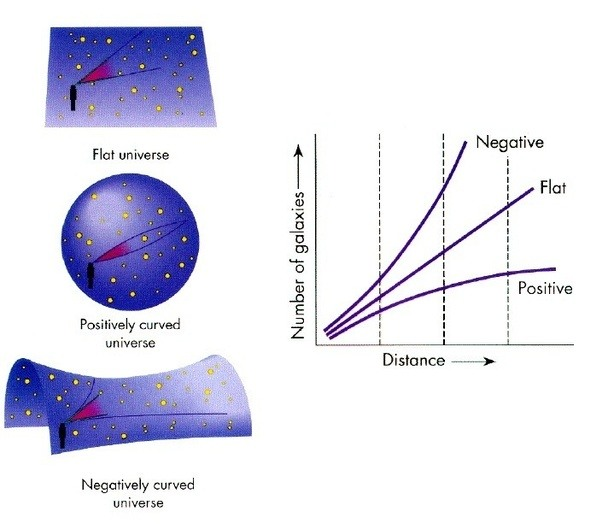
source
Do not worry. If you study the mathematical form of general relativity carefully, you will find that space-time is not only curved, but also its curvature is often related to negative energies. So a zero-energy universe is entirely possible. Specifically, our universe obtains positive energy from matter and radiation, but these positive energies are completely canceled by the negative energy due to the curvature of space-time. Therefore, the total energy of the universe is exactly zero.
If that's the case, time may be emerging, and there is the earliest moment when a clock starts to "tick" - there was no concept of time before. That's when the big bang happened.

References for Text and Images:
- Big Bounce
- An eternal quantum potential or an eternal Creator God
- On the origin of universes by means of natural selection—or, blinded by big bang blackness
- Bouncing Back
- What could happen to our Universe: Big Bounce
- Big Bang
Support @steemstem and the #steemstem
project - curating and supporting quality STEM
related content on Steemit

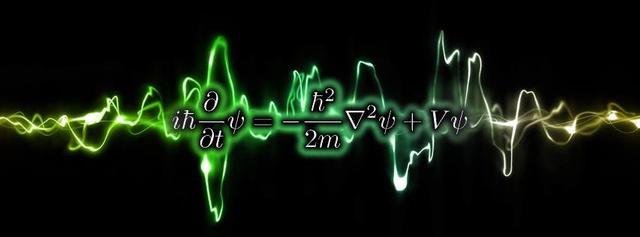
Bite Strength: 7.41% }{ Strike Speed: 64/Millisecond
Venom circulation period: 7 days
After 7 days.. The Golden Cobra's venom converts to SBD/SP! ;)
Hit placed by: @mike11
Send 0.001-0.006 SBD/STEEM + url->memo to @thegoldencobra for an upvote! :)
Service released: 2/6/18 - Give us a chance! :)
Many contenders out there. I guess, intuitively, a universe that always existed and bounces like an accordion makes more sense to me than something coming out of nothing.
You got a 5.53% upvote from @minnowvotes courtesy of @mike11!
You got a 2.37% upvote from @inciter courtesy of @mike11!
You got a 3.13% upvote from @ipromote courtesy of @mike11!
If you believe this post is spam or abuse, please report it to our Discord #abuse channel.
If you want to support our Curation Digest or our Spam & Abuse prevention efforts, please vote @themarkymark as witness.
This post has received a 3.65 % upvote from @chronocrypto thanks to: @mike11.
You got a 0.69% upvote from @mercurybot courtesy of @mike11!
You got a 0.74% upvote from @allaz courtesy of @mike11!
Greetings! I am a minnow exclusive bot that gives a 5X upvote! I recommend this amazing guide on how to be a steemit rockstar! I was made by @EarthNation to make Steemit easier and more rewarding for minnows.
Being A SteemStem Member